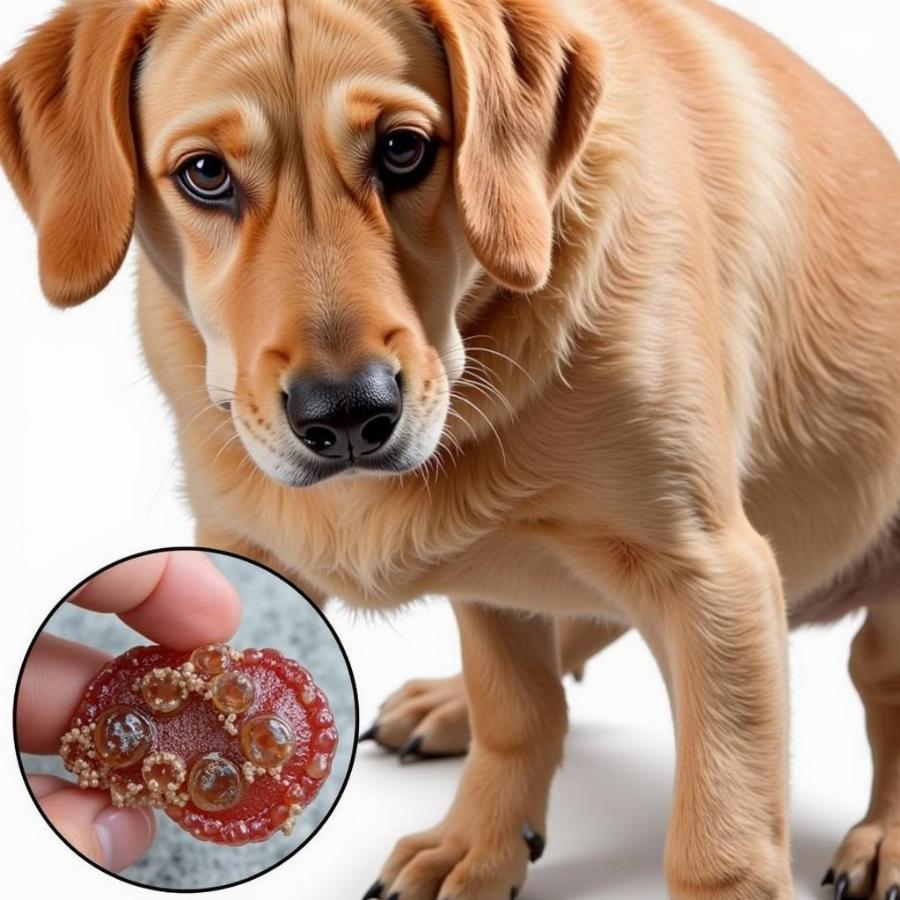Diarrhea is a common problem in dogs, characterized by loose or watery stools. It can be caused by a variety of factors, ranging from mild dietary indiscretions to serious underlying medical conditions. As a concerned dog owner, it’s essential to understand the potential causes of diarrhea so you can seek appropriate veterinary care for your furry companion.
This comprehensive guide will delve into the various reasons why your dog might be experiencing diarrhea, what symptoms to look out for, and when it’s crucial to consult a veterinarian.
Common Culprits Behind Dog Diarrhea
Let’s explore some of the most frequent causes of diarrhea in dogs:
Dietary Indiscretion: The Case of the Greedy Gut
One of the most common causes of dog diarrhea is something we’ve all been guilty of: overindulging! Just like us, dogs can get upset stomachs from eating too much, too fast, or switching to a new food abruptly.
Imagine this: you’re enjoying a delicious meal, and your furry friend, with those irresistible puppy-dog eyes, manages to snag a few bites of your rich, human food. While a small treat now and then might not hurt, a sudden change in diet can disrupt your dog’s digestive system, leading to diarrhea.
Here are some common dietary indiscretions that can cause diarrhea:
- Table scraps: Rich, fatty, or spicy foods can be difficult for dogs to digest.
- Spoiled food: Bacteria in spoiled food can cause food poisoning.
- Sudden diet changes: Switching to a new food too quickly can upset the balance of bacteria in your dog’s gut.
Parasites: Unwanted Guests in Your Dog’s Gut
Intestinal parasites, such as roundworms, hookworms, whipworms, and Giardia, are another common cause of diarrhea in dogs. These microscopic invaders can wreak havoc on your dog’s digestive system, leading to inflammation and diarrhea.
Puppies and dogs who spend time outdoors or in contact with other animals are particularly susceptible to parasites.
 Dog Scratching with Magnified Parasites
Dog Scratching with Magnified Parasites
Infections: When Viruses and Bacteria Take Hold
Viral and bacterial infections can also lead to diarrhea in dogs. Some common culprits include:
- Parvovirus: A highly contagious virus that can cause severe, often bloody, diarrhea, especially in puppies.
- Distemper: Another serious viral infection that can cause a range of symptoms, including diarrhea.
- Salmonella: A bacterial infection that can cause gastroenteritis in both dogs and humans.
Allergies and Food Intolerances: When Your Dog’s Body Reacts
Just like humans, dogs can develop allergies or intolerances to certain foods or ingredients. Common culprits include:
- Beef
- Chicken
- Dairy
- Wheat
- Soy
If your dog consistently develops diarrhea after eating a particular food, it’s essential to consult your veterinarian to rule out any food allergies or intolerances.
Medications: Unintended Consequences
Certain medications, such as antibiotics, can disrupt the balance of bacteria in your dog’s gut, leading to diarrhea. If you notice diarrhea after starting your dog on a new medication, contact your veterinarian.
Stress and Anxiety: The Gut-Brain Connection
Believe it or not, stress and anxiety can also manifest as digestive issues, including diarrhea, in dogs. Just like us, our furry friends experience stress, and sometimes, their sensitive stomachs bear the brunt of it.
Changes in routine, travel, separation anxiety, or even a trip to the veterinarian can trigger stress-induced diarrhea in dogs.
When to Worry: Red Flags to Watch Out For
While most cases of diarrhea in dogs resolve with simple home care, some situations warrant immediate veterinary attention.
Contact your veterinarian immediately if your dog’s diarrhea is accompanied by any of the following:
- Blood in the stool
- Black, tarry stools
- Vomiting
- Lethargy
- Loss of appetite
- Fever
- Abdominal pain
- Diarrhea lasting more than 24 hours
These symptoms could indicate a more serious underlying condition requiring prompt veterinary care.
FAQs: Answering Your Concerns About Dog Diarrhea
Q: What can I give my dog for diarrhea?
A: It’s best to consult your veterinarian before giving your dog any medication for diarrhea. They can determine the underlying cause and recommend the appropriate treatment.
Q: How long should diarrhea last in a dog?
A: Most cases of diarrhea in dogs resolve within 24-48 hours with simple home care. However, if your dog’s diarrhea persists for more than 24 hours, or if you notice any alarming symptoms, contact your veterinarian immediately.
Q: Is rice good for dogs with diarrhea?
A: A bland diet of boiled chicken and rice can be helpful for dogs with diarrhea. However, it’s essential to consult your veterinarian for guidance on the appropriate diet for your dog’s specific needs.
Need More Help? Contact Beaut Dogs
Dealing with dog diarrhea can be concerning, but understanding the potential causes and knowing when to seek veterinary attention can help you keep your furry friend happy and healthy.
For personalized advice and support on all aspects of dog care, contact Beaut Dogs at [email protected]. We’re here to help you navigate the wonderful world of dog ownership.
Beaut Dogs is your trusted source for expert guidance on dog breeds, care, and well-being. Visit our website at https://beautdogs.com for a wealth of information to help you provide the best possible care for your canine companion.